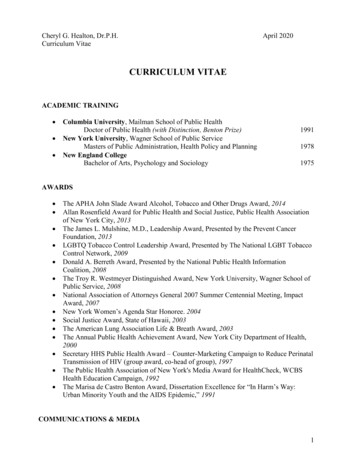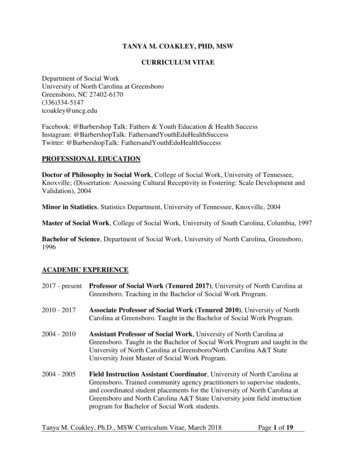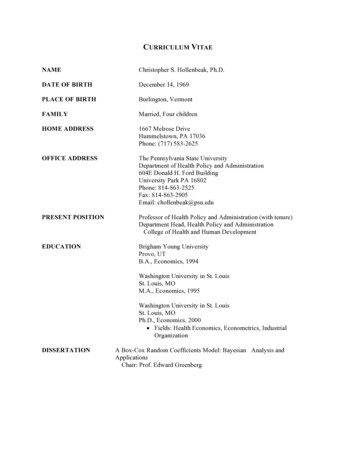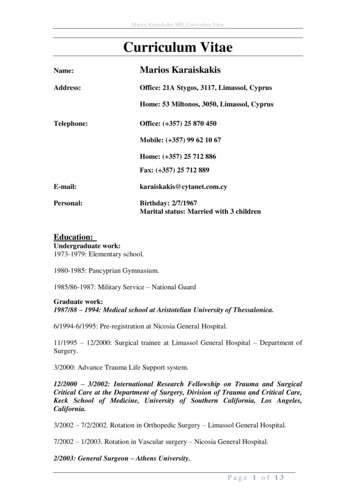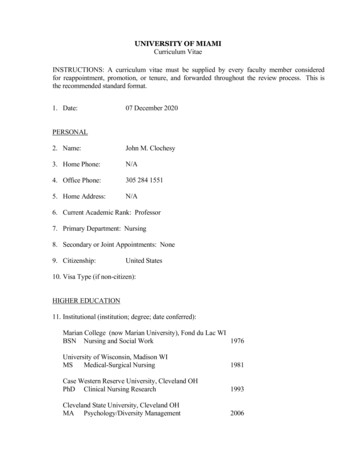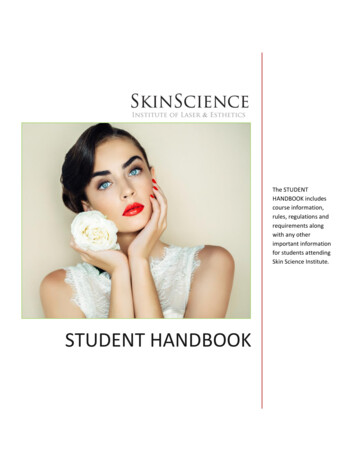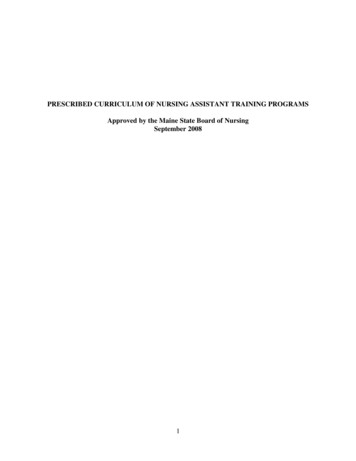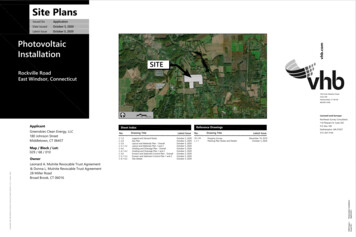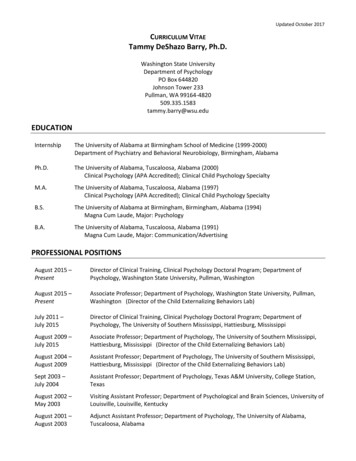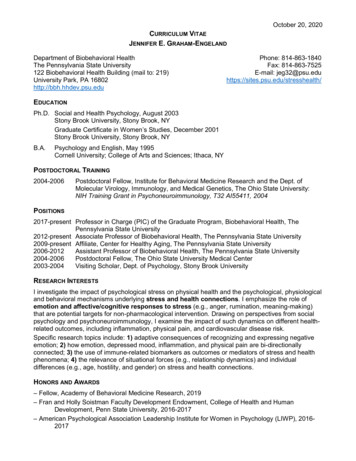
Transcription
CURRICULUM VITAEJENNIFER E. GRAHAM-ENGELANDDepartment of Biobehavioral HealthThe Pennsylvania State University122 Biobehavioral Health Building (mail to: 219)University Park, PA 16802http://bbh.hhdev.psu.eduOctober 20, 2020Phone: 814-863-1840Fax: 814-863-7525E-mail: UCATIONPh.D. Social and Health Psychology, August 2003Stony Brook University, Stony Brook, NYGraduate Certificate in Women’s Studies, December 2001Stony Brook University, Stony Brook, NYB.A.Psychology and English, May 1995Cornell University; College of Arts and Sciences; Ithaca, NYPOSTDOCTORAL TRAINING2004-2006Postdoctoral Fellow, Institute for Behavioral Medicine Research and the Dept. ofMolecular Virology, Immunology, and Medical Genetics, The Ohio State University:NIH Training Grant in Psychoneuroimmunology, T32 AI55411, 2004POSITIONS2017-present Professor in Charge (PIC) of the Graduate Program, Biobehavioral Health, ThePennsylvania State University2012-present Associate Professor of Biobehavioral Health, The Pennsylvania State University2009-present Affiliate, Center for Healthy Aging, The Pennsylvania State University2006-2012Assistant Professor of Biobehavioral Health, The Pennsylvania State University2004-2006Postdoctoral Fellow, The Ohio State University Medical Center2003-2004Visiting Scholar, Dept. of Psychology, Stony Brook UniversityRESEARCH INTERESTSI investigate the impact of psychological stress on physical health and the psychological, physiologicaland behavioral mechanisms underlying stress and health connections. I emphasize the role ofemotion and affective/cognitive responses to stress (e.g., anger, rumination, meaning-making)that are potential targets for non-pharmacological intervention. Drawing on perspectives from socialpsychology and psychoneuroimmunology, I examine the impact of such dynamics on different healthrelated outcomes, including inflammation, physical pain, and cardiovascular disease risk.Specific research topics include: 1) adaptive consequences of recognizing and expressing negativeemotion; 2) how emotion, depressed mood, inflammation, and physical pain are bi-directionallyconnected; 3) the use of immune-related biomarkers as outcomes or mediators of stress and healthphenomena; 4) the relevance of situational forces (e.g., relationship dynamics) and individualdifferences (e.g., age, hostility, and gender) on stress and health connections.HONORS AND AWARDS– Fellow, Academy of Behavioral Medicine Research, 2019– Fran and Holly Soistman Faculty Development Endowment, College of Health and HumanDevelopment, Penn State University, 2016-2017– American Psychological Association Leadership Institute for Women in Psychology (LIWP), 20162017
October 20, 2020– College of Health and Human Development, Penn State University, Commencement Marshal,December 2014– Functional MRI Visiting Fellowship, Short-Course in Functional Magnetic Resonance Imaging,MGH/HST Athinoula Martinos Center for Biomedical Imaging, Boston, October, 2014– American Psychosomatic Society Scholar Research Award, 2006– Psychoneuroimmunology Research Society Scholars Award, 2006– Pittsburgh Mind-Body Center Summer Institute, travel stipend, 2006– American Psychological Association, Division 38 Student Research Award, 2003– Madeline Fusco Fellowship, Stony Brook University, 2003– Graduate Council Commendation to Distinguished Doctoral Students, Stony Brook University, 2003– Award for Excellence in Teaching, Stony Brook University, Dept. of Psychology, 2003– Dissertation Award, Stony Brook University, Dept. of Psychology, 2002– Travel Awards, Stony Brook University, Dept. of Psychology, 2001 and 2003GRANTSOngoing (Current) Grants (as PI or Co-I)07/01/201806/30/2023NIH RF1 AG056487 3,781,840National Institute on Aging (NIA)Integrative biobehavioral and psychosocial risk for cognitive decline in the elderlyRole: PI (Multiple PIs: Christopher Engeland & Jennifer Graham-Engeland)01/15/201801/14/2023NIH R01 HL137809 2,643,761National Heart, Lung, and Blood Institute (NHLBI)Early psychosocial intervention and child and parent cardiovascular disease riskRole: Co-I (PI: Hannah Schreier)09/15/201909/14/2021NIH R21 AG066140 439,617National Institute on Aging (NIA)Sex hormones, inflammation, and cognitive decline in older men and womenRole: Co-I (PI: Erik Knight).04/17/202004/16/2021Funding Agency: Social Science Research InstituteWork-Health Intersection at PerimenopauseRole: Co-I (PI: Alicia Grandey, Psychology) 4910Proposals Under ReviewSubmitted04/08/2020NIH R01HL152629National Heart, Lung, and Blood Institute (NHLBI) 3,909,373The impact of social isolation in adolescence and young adulthood on cardiovasculardisease riskRole: PI (Multiple PIs: Jennifer Graham-Engeland & Mark Feinberg)Submitted02/24/2020Funding Agency: National Science Foundation 750,000Human-perceptive co-robots through physiologically enabled pathways in dynamic andchanging construction environmentRole: Co-PI (PI: Houtan Jebelli, Architectural Engineering)Submitted03/15/2020Funding Agency: National Science Foundation 1,184,101Collaborative research: Future of workplace health monitoring through holographicmapping of physiological responsesRole: Co-PI (PI: Houtan Jebelli, Architectural Engineering)
Submitted04/30/2020October 20, 2020Funding Agency: industryXchange Multi-disciplinary Research Seed Grants: ArtificialIntelligence/Machine LearningPrecise monitoring of fieldworker health with context-sensitive wearable biosensorsRole: Co-PI (PI: Houtan Jebelli, Architectural Engineering)Ongoing Training and Student Grants (as faculty mentor / sponsor)05/02/201605/02/2021NIH T32 AG049676 1,963,357National Institute on Aging (NIA)Psychosocial determinants and biological pathways to healthy aging (Pathways)Role: Faculty (PI: David Almeida)09/30/201608/31/2021NIH UL1 18,400,465National Institutes of HealthTraining Program of the Penn State Clinical and Translational Science InstituteRole: Faculty09/01/201908/08/2024NIH R25 (Postbaccalaureate Research Education Program)National Institutes of Health NHLBI)Improving Access through Research and Training (IMPACT)Role: Faculty 395,000Completed Grants09/30/201208/31/2017NCE-2019NIH R01 AG042595 1,952,507National Institute on Aging (NIA), with National Institute on Mental Health (NIMH)Inflammatory mediators of stress and cognitive agingRole: PI (Multiple PIs: Jennifer Graham-Engeland & Christopher Engeland)08/01/201707/31/2019NIH F31 DK112641-01National Institute of Diabetes and Digestive and Kidney Diseases (NIDDK)Inflammatory Stress Response and Loss of Control Eating in YouthRole: Consultant (PI: Lisa Shank)09/01/201808/31/2019Bridges to Translation IV Pilot Award 50,000Clinical Translational Science InstituteDiet and stress responses in low-income rural adults under the dynamics of foodinsecurityRole: Co-I (PI: Muzi Na)04/20/201808/20/2018BBH Seed FundDepartment of Biobehavioral Health (BBH)Cognitive Profiles and Metabolic Syndrome: Biobehavioral Mechanisms ExplainingIncreased Risk and ProgressionRole: Co-I (PI: Kyle Murdock)08/16/201608/15/2017Funding Agency: Social Science Research Institute, Penn State UniversityPerinatal Coparenting Intervention and Cardiovascular Disease RiskRole: Co-I (PI: Hannah Schreier)04/01/201503/31/2017NIH F32 AG048698 122,286National Institute on Aging (NIA)The role of daily well-being in inflammatory processes and diurnal cortisol rhythms.Role: Co-Sponsor / Faculty (PI: Nancy Sin)01/10/201601/09/2017Funding Agency: Social Science Research Institute, Penn State University 4,459The Body Mindfulness Project: Changing chronic maladaptive patterns in body and 55,853 22,490
mindRole: Co-I (PI: Andrew Belser)October 20, 202009/14/201509/13/2016Funding Agency: Social Science Research Institute, Penn State University 3,300Identifying antecedents and consequences of the disclosure of musculoskeletal painamong hotel housekeepersRole: Co-I (PI: Larry Martinez)05/30/201305/29/2016Funding Agency: Social Science Research Institute, Penn State University 4,978How pain, mood, stress, social and health behavior, and inflammation are connected inundergraduate students with and without chronic pain.Role: PI03/01/201402/28/2015Funding Agency: Social Science Research Institute, Penn State University 43,000Daily stress and premature cognitive aging as long-term sequelae of childhood sexualabuse.Role: Co-I (PI. Jennie Noll)07/10/201207/09/2014Funding Agency: Social Science Research Institute, Penn State UniversityValidation of salivary to blood-based inflammatory markers and associationswith psychosocial and immune health indicators.Role: PI10/31/201110/30/2013Funding agency: Social Science Research Institute, Penn State UniversityInflammatory mediators of psychological stress and cognitive aging.Role: PI 24,74801/01/201301/01/2014Funding Agency: CTSI Community Engagement Research CoreThe Pennsylvania Adult Rural Health Study.Role: Co-I (PI: Martin Sliwinski, Penn State University) 70,0002010-2011Funding Agency: Pennsylvania State Institute for Neuroscience 37,420Developing an animal model of cognitive bias to study the impact of emotion on healthand behavior.Role: Co-I (PI: Victoria Braithwaite, Penn State University)10/21/200806/30/2013Funding Agency: Social Science Research Institute, Penn State UniversityThe Rheumatoid Arthritis Multidimensional Project (RAMP).Role: PI 35,0002007-2008Funding Agency: Social Science Research Institute, Penn State UniversityRamping up for the Rheumatoid Arthritis Multidimensional Project (RAMP).Role: PI 3,200 4,940EDITORIAL SERVICEEditorial Boards2020-present Annals of Behavioral Medicine2020-present Health Psychology Review2008-2012Journal of Social IssuesAd Hoc ReviewerPsychosomatic Medicine; Health Psychology; Annals of Behavioral Medicine; Brain, Behavior, andImmunity; Psychoneuroendocrinology; Journal of Gerontology: Psychological Sciences; Gerontology;Journal of Behavioral Medicine; Journal of Psychosomatic Research; Psychology and Health; TheClinical Journal of Pain; Psychiatry Research; Journal of Family Issues; Journal of Wound Care;
October 20, 2020Personal Relationships; Aging and Health; Journal of Research on Adolescence; PLOS-one; PainMedicine; Sleep HealthPROFESSIONAL SERVICEGrant Application ReviewStanding member, NIH Study section: Social Psychology, Personality, and Interpersonal Processes(SPIP), July 2017-presentNIH Study section ad-hoc reviewer: Social Psychology, Personality, and Interpersonal Processes(SPIP), Oct 2015, Washington, D.C.; Feb 2016, San Diego, CASpecial emphasis panel for the National Center for Complementary and Alternative Medicine(NCCAM), initiative in non-pharmacological approaches to manage pain and co-morbid conditions,ZAT1 HS-15; March 31-April 1, 2014, Bethesda, MDMerit Review for the Department of Veteran Affairs, Mental Health and Behavioral Sciences Panel(MHBA), December 2015.Penn State Clinical and Translational Science Institute, Bridges to Translation, ad-hoc reviewer,September 2015.Conference Related ServiceAbstract Reviewer, American Psychosomatic Society (International Conference); Fall 2009, Fall 2010,2016, Fall 2019Abstract Reviewer, American Psychological Association, Div 38; Spring 2012, 2013, 2015Faculty Mentor, American Psychosomatic Society Mentor/Mentee program, 2014, 2013, 2016Abstract Reviewer, Women’s Health Research Day, Penn State University, 2017Other Professional Service2015, 2017; Tenure and Promotion Letter of ReferencePendingAdvisory Board member; NSF grant proposal submitted 7/30/2020; UnderstandingSTEM Students’ Social and Emotional Engagement and Attention Level (SEEAL) inDistance Learning Through the Integration of Wearable Physiological Sensing andEye-Tracking TechnologyUNIVERSITY SERVICECommittees2016-present Faculty representative, Alumni Society Board of Directors, College of Health andHuman Development, Penn State University2017-present Health and Human Development (HHD) Professor in Charge (PIC) of GraduatePrograms Committee2017-present Chair, BBH Graduate Program Committee, Biobehavioral Health, Penn StateUniversity2017-present BBH Advisory Committee (as PIC), Biobehavioral Health, Penn State University2018-present Committee member, Search Committee for Teaching Assistant Professor (Ethics),Biobehavioral Health, Penn State University2019-present Chair, Faculty Search, Edna Bennett Pierce Endowed Professorship in BiobehavioralHealth, Biobehavioral Health, Penn State University2019, Spring Committee member, Graduate Student Travel Grant Review Committee, GraduateSchool, Penn State University2018Committee member, Soistman Faculty Endowment Selection Committee, College ofHealth and Human Development, Penn State University
0032000-2001200019991999October 20, 2020Committee member, Search Committee for Research Assistant Professor (Methods),Biobehavioral Health, Penn State UniversityAD-14 committee (appointed) to review HHD’s Research and Graduate Education,College of Health and Human Development, Penn State UniversitySearch Committee for Associate Dean of the Graduate School, Penn State UniversitySoistman Faculty Endowment Selection Committee, College of Health and HumanDevelopment, Penn State UniversityBBH Graduate Program Committee, Biobehavioral Health, Penn State UniversityBBH Advisory Committee (elected), Biobehavioral Health, Penn State UniversityChair, Graduate Council Committee on Committees and Procedures, Penn StateUniversityChair, Graduate Council Fellowship and Awards, Penn State UniversityGraduate Council (elected), College of Health and Human Development, Penn StateUniversityWomen’s Leadership Initiative Internal Advisory Committee, Penn State UniversityChair, Website Development Committee, Biobehavioral Health, Penn State UniversityDepartment Head Search Committee, Penn State UniversitySabbatical Leave Review Committee, College of Health and Human Development,Penn State University[Sabbatical]Website Faculty Liaison, Biobehavioral Health, Penn State UniversityGraduate Admissions Committee, Biobehavioral Health, Penn State UniversityChair, Graduate Council Committee on Academic Standards, Penn State UniversityGraduate Council Committee on Academic Standards, Penn State UniversityGraduate Council (elected), Penn State UniversityFaculty Search Committee, Biobehavioral Health, Penn State UniversityGraduate Admissions Committee, Biobehavioral Health, Penn State UniversityScholarships Committee, Biobehavioral Health, Penn State UniversityAwards Committee, Biobehavioral Health, Penn State UniversityGraduate Committee, Psychology, Stony Brook UniversityGrievance Committee, Psychology, Stony Brook UniversityFaculty Search Committee, Women’s Center, Stony Brook UniversityNew Graduate Student Orientation, Psychology, Stony Brook UniversityFaculty Search Committee, Psychology, Stony Brook UniversityPUBLICATIONSGraham 1, J.E., Lobel, M., & DeLuca, R.S. (2002). Anger after childbirth: An overlooked reaction topostpartum stressors. Psychology of Women Quarterly, 26, 222-233. doi: 10.1111/14716402.00061Graham, J.E., Robles, T.F., Kiecolt-Glaser, J.K., Malarkey, W.B., Bissell, M.G., & Glaser, R. (2006).Hostility and pain are related to inflammation in older adults. Brain, Behavior, and Immunity,20, 389-400. doi: 10.1016/j.bbi.2005.11.002Graham, J.E., Christian, L.M. & Kiecolt-Glaser, J.K. (2006). Marriage, health, and immune function: Areview of key findings and the role of depression. In S.R.H. Beach, M.Z. Wamboldt, N.J.Kaslow, R.E. Heyman, M.B. First, L.G. Underwood, & D. Reiss (Eds.), Relational Processesand DSM-V: Neuroscience, Assessment, Prevention, and Treatment. (pp. 61-76). WashingtonDC: American Psychiatric Publishing, Inc.Graham, J.E., Christian, L. M., & Kiecolt-Glaser, J.K. (2006). Close relationships and immunity. In R.Ader (Ed.), Psychoneuroimmunology, 4th ed, Vol. 2, 781-798. Burlington, MA: Elsevier, Inc.1Note, prior to July 2013, Dr. Jennifer Graham-Engeland published under Dr. Jennifer Graham.
October 20, 2020Graham, J.E., Christian, L.M., & Kiecolt-Glaser, J.K. (2006). Stress, age, and immune function:Toward a lifespan approach. Journal of Behavioral Medicine, 29, 389-400. doi:10.1007/s10865-006-9057-4Cannella, D.T., Lobel, M., Glass, P., Lokshina, I., & Graham, J.E. (2007). Factors associated withdepressed mood in chronic pain patients: The role of intrapersonal coping resources. Journalof Pain, 8, 256-262. doi: 10.1016/j.jpain.2006.08.007Christian, L.M., Graham, J.E., Padgett, D.A., Glaser, R., Kiecolt-Glaser, J.K. (2007). Stress andwound healing. Neuroimmunomodulation, 13, 337-46. doi: 10.1159/000104862Kiecolt-Glaser, J.K., Graham, J.E., Malarkey, W.B., Porter, K., Lemeshow, S., Glaser, R. (2008).Olfactory influences on mood and autonomic, endocrine, and immune function.Psychoneuroendocrinology, 33, 328-339. doi: 10.1016/j.psyneuen.2007.11.015Graham, J.E., Lobel, M., Glass, P., & Lokshina, I. (2008). Effects of written constructive angerexpression in chronic pain patients: Making meaning from pain. Journal of BehavioralMedicine, 31, 201-212. doi: 10.1007/s10865-008-9149-4Kiecolt-Glaser, J.K., Graham, J.E., Malarkey, W.B., Porter, K., Lemeshow, S., Glaser, R. (2008).Comment in response to letter regarding ‘Olfactory influences on mood and autonomic,endocrine, and immune function’. Psychoneuroendocrinology, 33, 1303. doi:10.1016/j.psyneuen.2008.07.001Lobel, M., Cannella, D.T., Graham, J.E., DeVincent, C., Schneider, J., and Meyer, B. A. (2008).Pregnancy-specific stress, prenatal health behaviors, and birth outcomes. Health Psychology,27, 604-615. doi: 10.1037/a0013242Graham, J.E., Glaser, R., Loving, T.J., Malarkey, W.B., Stowell, J.R., Kiecolt-Glaser, J.K. (2009).Cognitive word use during marital conflict attenuates increases in inflammatory cytokines.Health Psychology, 28, 621-630. doi: 10.1037/a0015208Christian, L.M., Deichert, N.T., Gouin, J., Graham, J.E., & Kiecolt-Glaser, J. K. (2009). Psychologicalinfluences on endocrine and immune function. In G. Berntson and J. Cacioppo (Eds.),Handbook of Neuroscience for the Behavioral Sciences, pp. 1260-1279, ch. 64. Hoboken,New Jersey: John Wiley & Sons Inc.Graham, J.E., & Streitel, K. L.* 2 (2010). Sleep quality and acute pain severity among young adultswith and without chronic pain: The role of biobehavioral factors. Journal of BehavioralMedicine, 33, 335-45. doi: 10.1007/s10865-010-9263-yStreitel, K. L.*, Graham, J.E., Pickering, T.G., & Gerin, W. (2011). Explaining gender differences inthe white coat effect. Blood Pressure Monitoring, 16, 1-6. doi:10.1097/MBP.0b013e32833f56c2Engeland, C.G. & Graham, J.E. (2011). Psychoneuroimmunological aspects of wound healing andthe role of pain. In D. Upton (Ed.). Psychological Impact of Pain in Patients with Wounds.Wounds UK Ltd., London, 87-114.Zawadzki, M. J., Graham, J.E., & Gerin, W. (2012). Rumination and anxiety mediate the effect ofloneliness on depression and sleep quality in college students. Health Psychology, 32, 212-22.doi: 10.1037/a0029007Song, S.*, Graham, J.E., Susman, E. & Sohn, Y. (2012). The cost of ineffective emotion regulationand problem drinking differs by emotional disposition, delinquency, and gender of SouthKorean adolescents. Journal of Child and Adolescent Substance Abuse, 21, 710029.* Denotes a graduate student or postdoctoral scholar under the supervision of Dr. Graham-Engeland; † Denotes anundergraduate student under the supervision of Dr. Graham-Engeland
October 20, 2020Graham, J.E., Song, S.*, & Engeland, C.G. (2012). Acute pain speeds skin barrier wound recovery inhealthy men and women. Journal of Psychosomatic Research, 73, 452-8. doi:10.1016/j.jpsychores.2012.07.011Slavish, D.*, & Graham-Engeland, J.E. (2014). Rumination mediates the relationships betweendepressed mood and both sleep quality and self-reported health in young adults. Journal ofBehavioral Medicine, 2, 204-13. doi: 10.1007/s10865-014-9595-0.Sin, N. L.*, Graham-Engeland, J.E., & Almeida, D. (2014). Daily positive events and inflammation:Findings from the National Study of Daily Experiences. Brain, Behavior, and Immunity, 43,130-8. doi: 10.1016/j.bbi.2014.07.015Slavish, D.*, Graham-Engeland, J.E., Smyth, J.M., & Engeland, C.G. (2014). Salivary markers ofinflammation in response to acute stress. Brain, Behavior, and Immunity, 44, 253-269. doi:10.1016/j.bbi.2014.08.008Sin, N.L.*, Graham-Engeland, J.E., Ong, A.D., & Almeida, D. (2015). Affective reactivity to dailystressors is associated with elevated inflammation. Health Psychology, 34, 1154-65. doi:http://dx.doi.org/10.1037/hea0000240Song, S.*, Graham-Engeland, J. E., Corwin, E. J., Ceballos, R.M., Taylor, S.E., Seeman, T., & Klein,L. K. (2015). The role of multiple negative social relationships in inflammatory cytokineresponses to a laboratory stressor. PeerJ. doi: 10.7717/peerj.959Scott, S., Graham-Engeland, J.E., Engeland, C.G., Katz, M., Lipton, R., Smyth, J.M, Almeida, D.,Mogle, J., & Sliwinski, M.J. (2015). The Effects of Stress on Cognitive Aging, Physiology andEmotion (ESCAPE) Project. Biomed Central Psychiatry, 15, 1-14. doi: 10.1186/s12888-0150497-7Song, S.*, Graham-Engeland, J.E., Mogle, J., & Martire, L.M. (2015). The effects of daily mood andcouple interactions on the sleep quality of individuals with chronic pain. Journal of BehavioralMedicine, 38, 944-955. doi: 10.1007/s10865-015-9651-4Graham-Engeland, J.E., Zawadzki, M., Slavish, D.C.*, & Smyth, J.M. (2016). Depressive symptomsand momentary mood predict momentary pain among rheumatoid arthritis patients. Annals ofBehavioral Medicine, 50, 12-23. doi: 10.1007/s12160-015-9723-2Khoo, G.S. & Graham-Engeland, J.E. (2016). The benefits of contemplating tragic drama on selfregulation and health. Health Promotion International, 31, 187-99 doi: 10.1093/heapro/dau056Majd, M., Graham-Engeland, J.E., Smyth, J.M., Sliwinski, M.J., Lipton, R.B., & Katz, M.J., Engeland,C.G. (2018). Distinct inflammatory response patterns are evident among men and women withhigher depressive symptoms. Physiology and Behavior, 184, 108-115.doi:10.1016/j.physbeh.2017.11.009Slavish, D.C.*, Graham-Engeland, J.E., Sliwinski, M.J., Smyth, J.M., Almeida, D.M., Lipton, R.B., &Katz, M.J. (2018). Neuroticism, rumination, negative affect, and sleep: Examining betweenand within-person associations. Personality and Individual Differences, 123, 217-222.doi:10.1016/j.paid.2017.11.023Mathur, A.*, Graham-Engeland, J.E., Slavish, D.C.*, Smyth, J.M., Lipton, R., Katz, M., & Sliwinski,M.J. (2018). Recalled early life adversity and pain: The role of mood, sleep, optimism, andcontrol. Journal of Behavioral Medicine, 41, 504-515. 10.1007/s10865-018-9917-8Jones D.R.*, Johnson, J., Graham-Engeland, J.E., Park, C.L., & Smyth, J.M. (2018). Is perceivedgrowth associated with momentary indicators of health and well-being in people with asthmaor rheumatoid arthritis? Applied Psychology: Health and Well-Being, 10, 254-271. doi:10.1111/aphw.12129Jones, D.R.*, Graham-Engeland, J.E., Smyth, J.M., & Lehman, B.J. (2018). Clarifying theassociations between mindfulness meditation and emotion: Daily high- and low-arousalemotions and emotional variability. Applied Psychology: Health and Well-Being, 10, 504-523.doi: 10.1111/aphw.12135
October 20, 2020Graham-Engeland, J.E., Sin, N.L.*, Smyth, J.M., Jones, D.R.*, Knight, E.L., Sliwinski, M.J., Katz,M.J., Lipton, R.B., Almeida, D.M., & Engeland, C.G. (2018). Negative and positive affect aspredictors of inflammation: Timing matters. Brain, Behavior, and Immunity, 74, 222-230. doi:10.1016/j.bbi.2018.09.011Wilson, S.J., Martire, L.M., & Graham-Engeland, J.E. (2018). Capturing patients’ symptomexpression and spouses’ cardiovascular activity continuously: The feasibility of examiningmechanisms of disease risk in the home. Families, Systems, and Health, 36, 518-522. doi:10.1037/fsh0000369Slavish, D.C.*, Graham-Engeland, J.E., Engeland, C.G., Taylor, D.J., & Buxton, O.M. (2018).Insomnia symptoms are associated with elevated C-reactive protein in young adults.Psychology and Health, 33, 1396-1415. doi: 10.1080/08870446.2018.1500577Wardecker, B.*, Matsick, J.L., Graham-Engeland, J.E., & Almeida, D.M. (2019). Life satisfactionacross adulthood in Bisexual men and women: Findings from the Midlife in the United States(MIDUS) Study. Archives of Sexual Behavior, 48, 291-303. doi: 10.1007/s10508-018-1151-5Graham-Engeland, J.E., Song, S.*, Mathur, A.*, Wagstaff, D.A, Klein, L.K., Whetzel, C., & Ayoub, W.(2019). Emotional state can affect inflammatory responses to pain among rheumatoid arthritispatients: Preliminary findings. Psychological Reports, 122, 2026-2049. doi:10.1177/0033294118796655Slavish, D.C.*, Jones, D.R.*, Smyth, J.M., Engeland, C.G., Song, S.*, & Graham-Engeland, J.E.(2020). Positive affect and salivary markers of inflammation among young adults with andwithout chronic pain. International Journal of Behavioral Medicine, 27, 282-293. doi:10.1007/s12529-019-09795-2Knight, E.L., Majd, M., Graham-Engeland, J.E., Smyth, J.M., Sliwinski, M.J., Engeland, C.G. (2020).Brain, Behavior, and Immunity -- Health. Gender differences in the link between depressivesymptoms and ex vivo stimulated cytokine responses are associated with levels of endotoxinin blood. doi.org/10.1016/j.bbih.2019.100013Jones, D.R.*, Smyth, J.M., Engeland, C.G., Sliwinski, M.J., Russell, M.J., Sin, N.L., Almeida, D.A., &Graham-Engeland, J.E. (2020). Affect variability and inflammatory markers in midlife adults.Health Psychology, 39, 655-666. doi: 10.1037/hea0000868Szabo, Y.Z., Slavish, D., & Graham-Engeland, J.E. (2020). The effect of acute stress on salivarymarkers of inflammation: A systematic review and meta-analysis. Brain, Behavior, andImmunity, 887-900. https://doi.org/10.1016/j.bbi.2020.04.078Jones, D.R., Allen, H.K., Lanza, S.T., & Graham-Engeland, J.E. (in press). Daily associationsbetween affect and alcohol use among adults: The importance of affective arousal. AddictiveBehaviors.Wardecker, B.*, Graham-Engeland, J.E., & Almeida, D.M. (in press). Perceived discriminationpredicts elevated biological markers of inflammation among sexual minority adults. Journal ofBehavioral Medicine.Jones, D.R.* & Graham-Engeland, J.E. (in press). Positive affect and peripheral inflammatorymarkers among adults: A narrative review. Psychoneuroendocrinology.PUBLICATIONS IN PREPARATIONGraham-Engeland, J.E., DeMeo, N.*, Jones, D.R.*, Mathur, A.*, McGrady, M.E.†, Sliwinski, M.J.,Engeland, C.G., Smyth, J.M., Lipton, R.B., Katz, M.J. (in preparation). Individuals with bothhigher recent negative affect and physical pain have higher levels of C-Reactive protein.Jones, D.R., Smyth, J.M., & Graham-Engeland, J.E. (in preparation for the Journal of BehavioralMedicine). Exploring whether affective arousal matters for associations between positive affectand health behaviors.
October 20, 2020DeMeo, N.N.*, Scott, S., Jones, D.*, Smyth, J., Sliwinski, M.J., & Graham-Engeland, J.E. (inpreparation). Low extraversion is associated with fewer and less enjoyable daily uplifts, andcertain hassles.Kang, J., Sliwinski, M.J., Graham-Engeland, J.E., Scott, S.B., Hyun, J., & Smyth, J.M. (inpreparation). Trapped in stress: The impact of subjective social isolation on exposures andemotional responses to everyday stressors.Knight, E., Sliwinski, M.J., Graham-Engeland, J.E., & Engeland, C.G. (in preparation forPsychosomatic Medicine). Depressive symptoms and other negative psychological statespredict ex vivo inflammatory responses over time: The role of gender.Jones, D.R., Smyth, J.M., Sliwinski, J.E., & Graham-Engeland, J.E. (in preparation). Examiningindividual differences in high and low arousal positive affect in everyday life among midlifeadults.Song, S.*, Almeida, D., Majd, M., Engeland, C.G., DeMeo, N.*, & Graham-Engeland, J.E. (inpreparation). Depressive symptoms predict levels of inflammation 9 years later and the role ofsleep quality: Findings from the Midlife in the United States (MIDUS) Study.Khoo, S. & Graham-Engeland, J.E. (in preparation). Exploring the stress-buffering effect ofcontemplating tragic films on health symptoms.Mathur, A., Li, J., & Graham-Engeland, J.E. (in preparation for Neuroscience and BiobehavioralReviews). The role of emotion regulation in the relationship between early life adversity andinflammation in adulthood.INVITED TALKS AND CONFERENCE SYMPOSIALobel, M., Graham, J. E., & DeVincent, C.J. (2002, February). Explaining stress effects on birthoutcome: Health behaviors, ethnicity, and socioeconomic status. In R. Zambrana (Chair),Translating psychosocial research into culturally competent health care. Symposiumpresented at the American Psychological Association Conference on Women’s Health:Enhancing Outcomes in Women’s Health, Washington, D.C.Graham, J.E. (2005, October). Stress, emotions, and inflammation: the PNI of pain and woundhealing. Social and Health Psychology Colloquium, Stony Brook University, Stony Brook, NY.Graham, J.E., Kiecolt-Glaser, J.K., Malarkey, W.B., and Glaser, R. (2006, May). Proinflammatorycytokines, stress, and acute and chronic pain. In J.E. Graham (Chair) and L. Watkins (CoChair), Inflammation, immune activation, and pain: Basic science and clinical studies at thecutting edge. Symposium presented at the annual meeting of the PsychoneuroimmunologyResearch Society, Miami, Florida.Graham, J.E. (2007, April). Pain, inflammation, and stress: Implications for aging. Gerontology CenterColloquium, The Pennsylvania State University, University Park, PA.Graham, J.E. (2009, May). Relationship stress, aging, and immune function. In D. Fishbein (Chair),Relationships, stress, and health across the lifespan. Symposium presented at the annualmeeting of the Society for Prevention Research, Washington, D.C.Graham, J.E. (2009, June). Inflammatory markers from blood: Valu
2004-2006 Postdoctoral Fellow, Institute for Behavioral Medicine Research and the Dept. of Molecular Virology, Immunology, and Medical Genetics, The Ohio State University: NIH Training Grant in Psychoneuroimmunology, T32 AI55411, 2004 . P. OSITIONS. 2017-present Professor in Charge (PIC) of the Graduate Program, Biobehavioral Health, The
